HIT THE ROAD (2021)
A chaotic but tender family go on a road trip across a rugged landscape, fussing over the sick dog and getting on each other's nerves.
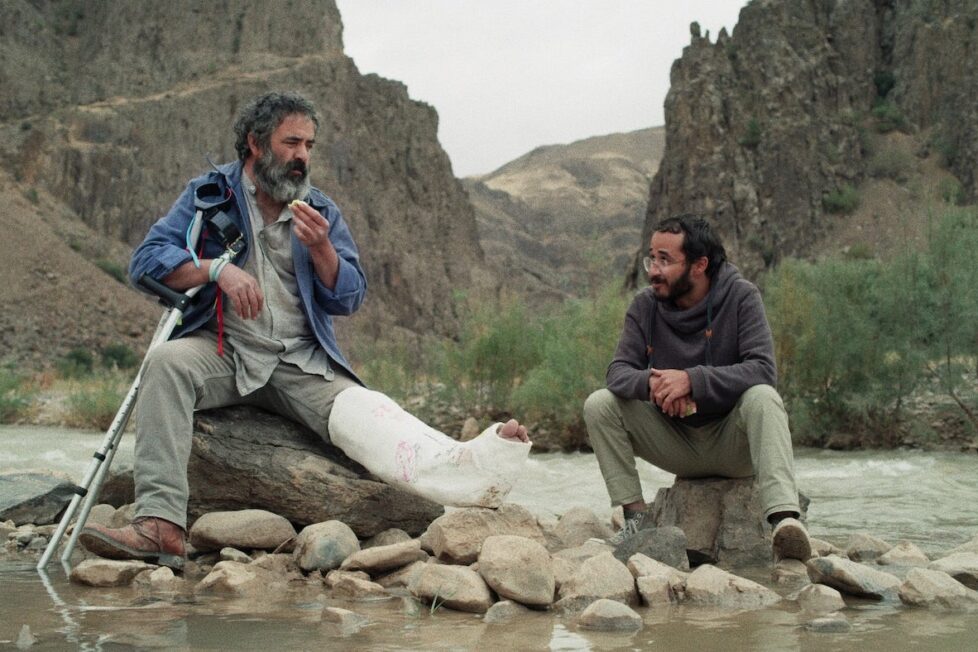
A chaotic but tender family go on a road trip across a rugged landscape, fussing over the sick dog and getting on each other's nerves.


It’s all too fitting that writer-director Panah Panahi—son of Jafar Panahi, acclaimed director of Taxi (2015), as well as a disciple of the late Abbas Kiarostami, whose most renowned work includes classics like the masterfully minimalist Taste of Cherry (1997)—has blasted into the world of filmmaking with his debut, Hit the Road / Jadde Khaki, yet another film primarily set in a car drawing out the lives of Iranian people and the world they exist in.
It’s so fitting, in fact, that it’s easy for frequent detractors of nepotism in the film industry to start piercing holes in Panahi’s name, but as this tragicomic family tale unfolds in the confines of a rented Mitsubishi with red permanent marker scrawled on one of its windows, it becomes evident Hit the Road is the byproduct of a confident new voice as authentic as those who preceded it. Unfurling its story of clashing personalities within a family and anticipatory grief with adept wit, genuine tension, and emotional honesty, Hit the Road’s potency lies in how it blends comedy and drama together well enough for its integration to feel not just seamless, but also authentic to these character’s emotions and experiences in a way that isn’t doused in self-serious angst or overbearing contemplativeness.
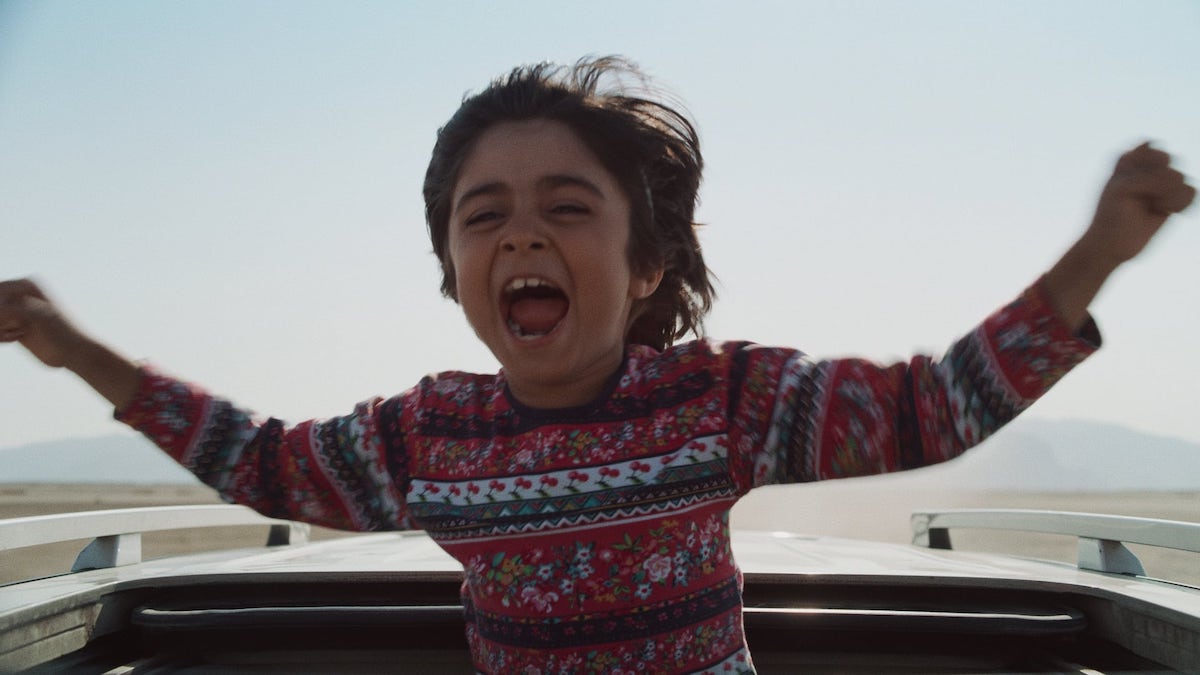
That seamlessness makes itself readily abundant in the film’s opening moments: an introduction to the family at its centre that at once acclimates us to the playfulness of its most humorous moments and the subtle yet ever-noticeable tension lying behind its more melancholy scenes. The first few moments of the film are dedicated to taking a cell phone from the precocious youngest son, credited as ‘Little Brother’ (a truly unrestrainable Rayan Sarlak), who’s indulging in a game of make-believe where he’s an important businessman taking calls from clients, and evidently seems frustrated by the fact his mother (Pantea Panahiha) and father, Khosro (Hassan Madjooni), are forcibly restraining him all the while. As his mother goes to completely dispose of the phone and cut its SIM card, Khosro does his best to distract him from what’s going on with an instantly recognizable low-key, incredibly sardonic sense of humour—an element of mystery added to the mix once we realise the older brother, Farid (Amin Simiar), hasn’t really been saying anything this entire time. They’ve also brought along their dying dog, Jesse—a pet whose mere presence is often the source of fierce debate among the parents here.
This tug-of-war between the film’s comedy, firmly anchored by the little brother, and the underlying secrecy of his family members’ intentions lasts for just about all throughout the film— it’s just we learn more and more about the intentions behind the latter as the events of the story progress. In the scenes that ensue, the parents show concern for a car that appears to be following them, until they find out it’s just a worried stranger informing them about a leak in their A/C—all the while, the younger brother’s constantly asking why his big brother’s leaving, questions that are met with evidently rehearsed responses about Farid heading out to get married and returning at some point. The family’s real purpose for leaving Tehran and coming all this way is, as audiences will infer with ease rather early on, to travel to the Turkish border and smuggle Farid out of the country. Panahi cleverly leaves the reason for this unexplained, but it’s also perhaps his way of taking an understated yet still fierce jab at the Iranian government that censored, imprisoned, and surveilled his father because of his films, and the same government that, in this film, seems to be the reason behind the urgency of Farid’s departure.
Narratively speaking, Hit the Road‘s emotional impact remains almost entirely predicated on the authenticity of the family of four at its centre—-an elegantly telegraphed dance of four whose naturalism simultaneously drives its central characters away from caricature and more towards deeply heartfelt and authentic characterization that drives home the covert yet impending heartbreak that awaits the four of them. All four of them may not have their backstories spelt out in excruciating detail, and deliberately so, so as to not remove the tension from the mystery they’re trying to construct for the younger brother, as well as to prevent this film from unnecessarily bloating itself outside of the constricted scope of its narrative.
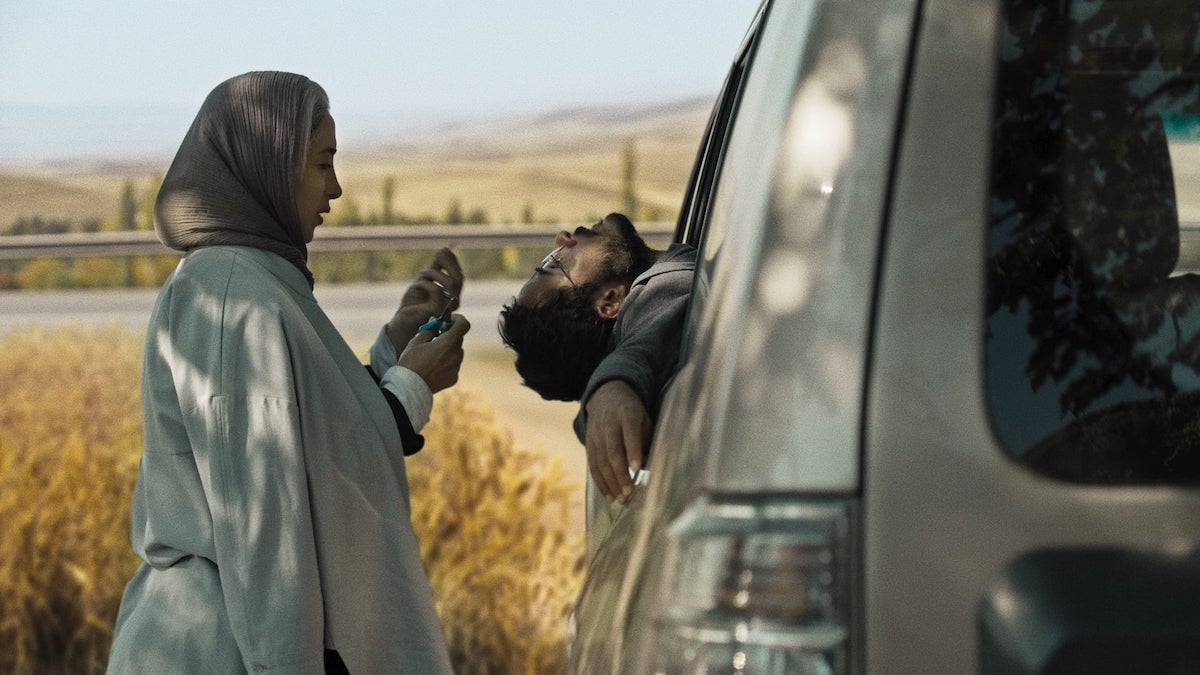
What we do figure out about them, however, largely centres around what kind of values they possess, the dimensionality of their feelings towards such a complicated and emotionally difficult situation, and at its most paramount, how close they’ve always been to each other even as they squabble and bicker over the most pointless things. In doing so, Panahi’s script invests as much as time into a gracefully simultaneous juggling act—building up their incredibly distinct personalities, constantly pitting them against each other in all sorts of situations, and all the while revealing their true feelings about Farid’s departure, not to mention how that’s bound to end up changing the course of all their lives for good.
Panahi’s troupe of four actors excel at selling this sense of naturalism, and it’s remarkable to be able to constantly see them in action as Panahi’s script shows all sorts of opportunities for them to add continual layers of dimension to their respective characters. Perhaps it’s the parents who are most worth noting first among them—Madjoon’s turn as Khosro, as mentioned above, places a significant amount of its weight on his sarcastic sense of despairing humour, a brand of genuinely humorous snark that’s offered earnest complexity from the fact that Khosro’s doing his best to mask the pain he feels of having to face his older son’s departure without saying all he needs to say. Meanwhile, Panahiha gives a similarly shattering turn as a mother playfully trying her best to ensure that the last impression she has of Farid is one of joy and love, however bittersweet—but as he frequently finds himself rejecting her attempts to connect more deeply, there’s a palpable sense of eminently maternal heartbreak that makes itself visible on the way she carries herself and speaks to her family that’s just as crushing to witness.
When it comes to Farid, Simiar wields his silence with relative ease, relying more on his expressions and his often concerned glances as he discloses little information about how he’s feeling or what’s going on. That reluctance to say anything goes two ways—so his mother isn’t worried too much about his wellbeing as he leaves, and perhaps more obviously so that his younger brother doesn’t find out about the real reason for his departure—and Simiar is entirely effective at portraying a man who’s only so good at walling himself off so that he doesn’t upset the people he loves before he has to leave them behind.
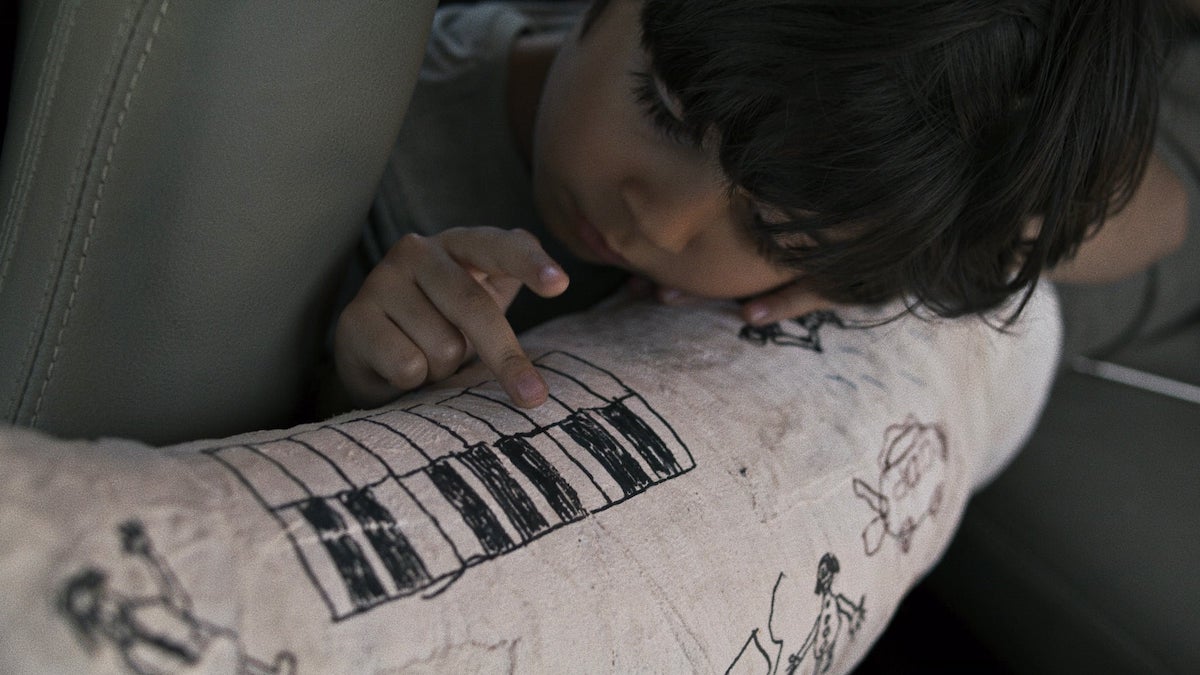
And, of course, we can’t leave out the young brother at the centre of it all, who also just so happens to serve as the film’s audience surrogate—an unexpectedly delightful Rayan Sarlak, who pulls off the endearing and screechy precocious-child archetype without ever once letting him devolve into obnoxious annoyance. He’s also single-handedly responsible for so much of the levity that prevents this entire film from backsliding into terribly bleak, constantly tear-jerking tragedy, as he jokingly bickers with the entire rest of his family over the silliest things and provides an innocently special kind of humour that doesn’t distract from the more serious occurrences happening around him—which often unfold at the same time as he’s doing something absolutely ridiculous, too.
Certainly, it often feels as if Hit the Road‘s power is weighted much more towards its narrative strength than its advantages in filmmaking—compared to its complexities in characterization and emotional momentum, the technical decisions made here are modest, with lots of still shots and practically-oriented framing—but that doesn’t necessarily discount Panahi’s direction from being subtly meaningful at points, either. The road trip in general, while generally packed into the family’s car for somewhat claustrophobic effect, features a handful of gorgeous, often hauntingly barren scenery that Panahi and cinematographer Amin Jafari capture with well-deployed wide shots that minimize the physical presence of the characters there, often at moments of great emotional intensity and narrative significance, too. There are also a few scenes of technical prowess that hold certain symbolic cues, adding layers to the film’s narrative; in a particularly notable instance, the presence of a biker with a sheepskin hood who guides the family to their next destination is marked with a fog that grows in the area upon his arrival, and menacingly fades away as he leaves the vicinity. These kinds of gestures are truly special when you notice them and become more abundant in the second half, which works in its favour when the narrative pacing starts to slow slightly compared to the first.
What makes Hit the Road a comparatively impressive debut for Panahi is just how efficiently and potently it gets to the emotional heart of this family’s every interaction. As much as their situation’s backdrop is the repressive shadow of the government they’re trying to evade, Hit the Road is dedicated to the humanity that’s being so profoundly affected by such a frightening, uncontrollable situation—at points tragically battered down, at points hilariously quirky, and at others solemnly reflective—but no one aspect of said humanity is given priority over another. It’s exactly what makes this film so shattering, humorous, and moving, filled to the brim with such delightfully rewarding and expertly crafted pathos that it may already mark the Panahi name as a generationally defining force in both Iranian and international cinema.
IRAN | 2021 | 93 MINUTES | 1.85:1 | COLOUR | FARSI

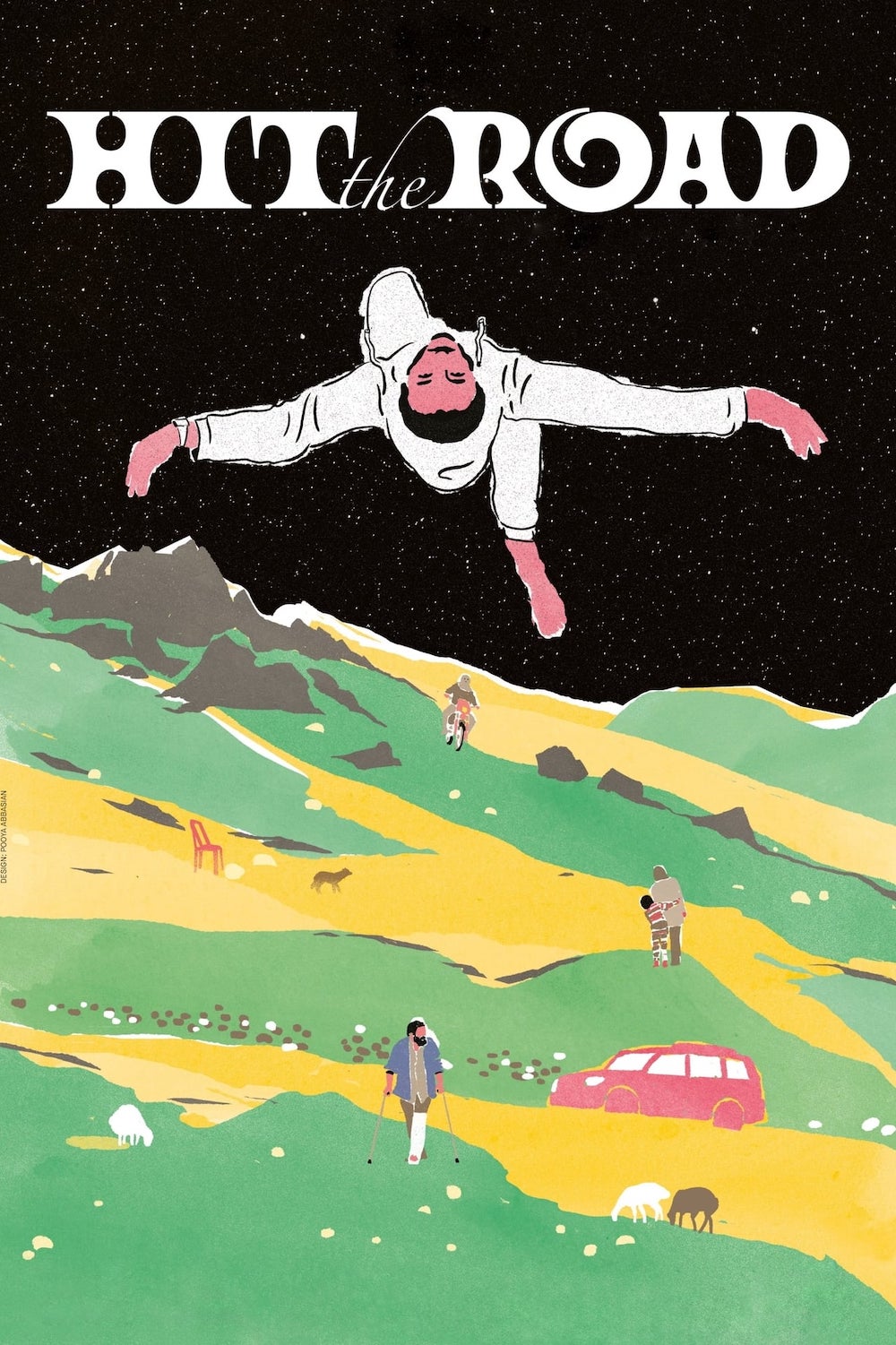
writer & director: Panah Panahi.
starring: Hassan Madjooni, Pantea Panahiha, Rayan Sarlak & Amin Simiar.
